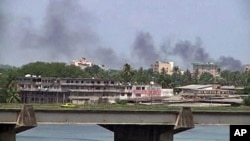Residents in Ivory Coast's main city of Abidjan say heavy fighting has broken out near the presidential palace, as fighters opposed to incumbent President Laurent Gbagbo move through the city.
Rebels backing the country's internationally recognized president, Alassane Ouattara, are also reported to be involved in fighting near the headquarters of the state-run television. Reuters news agency says the state television has gone off the air.
Ouattara forces have swept across Ivory Coast this week, seizing cities and towns and facing only minor resistance from Mr. Gbagbo's security.
Earlier Thursday, United Nations peacekeepers took control of the Abidjan airport, while France said its peacekeepers are patrolling parts of Abidjan where looting broke out.
South Africa said Mr. Gbagbo's army chief of staff and his family sought refuge Thursday at the Abidjan home of the South African ambassador.
The United States, the United Nations, former colonial power France and officials with Mr. Ouattara's government all issued calls Thursday for Mr. Gbagbo to step down.
Mr. Gbagbo has resisted pressure to give up power since Mr. Ouattara was declared the winner of last November's presidential election.
Mr. Ouattara's government issued a statement Thursday, saying it has imposed a nighttime curfew in Abidjan and ordered the closure of all the country's borders.
In an earlier statement broadcast on his private television station, Mr. Ouattara called on Gbagbo loyalists to switch sides. His aides predicted Thursday evening that Mr. Gbagbo could fall from power within hours.
U.N. Secretary-General Ban Ki-moon said he is closely following the situation, and he urged all parties to avoid harming civilians. He reiterated a demand that Mr. Gbagbo immediately cede power.
The United Nations said Thursday that at least 494 people have been killed since the political crisis began in early December. It says up to one million people have been displaced, with thousands fleeing west to Liberia or east to Ghana.
Mr. Ouattara has spent most of the last four months in an Abidjan hotel, protected by U.N. peacekeepers but surrounded by pro-Gbagbo security forces.
November's disputed election was meant to reunite Ivory Coast, nearly a decade after a brief civil war left it split into a rebel-controlled north and a government-controlled south.
The U.N. Security Council has approved sanctions against Mr. Gbagbo, including a travel ban and asset freeze on him, his wife and three key aides."
Some information for this report was provided by AFP and Reuters.




